Entrepreneurship: Ventures, Traits, and Impact Analysis
VerifiedAdded on 2020/01/21
|12
|4149
|490
Report
AI Summary
This report provides a comprehensive overview of entrepreneurship, examining different types of entrepreneurial ventures, including small, social, and large-scale businesses, and their relationships with the typology of entrepreneurship. It differentiates between public, private, and social ventures while analyzing the impact of micro and small businesses on the economy, particularly within the United Kingdom. The report further explores the significance of small businesses and start-ups in the growth of the social economy. It also delves into the characteristic traits and skills of successful entrepreneurs, aspects of entrepreneurial personality, and how personal background can influence entrepreneurs, along with the importance of innovation and productivity. This report provides a detailed analysis of the subject matter.

ENTREPRENEURSHIP
Paraphrase This Document
Need a fresh take? Get an instant paraphrase of this document with our AI Paraphraser
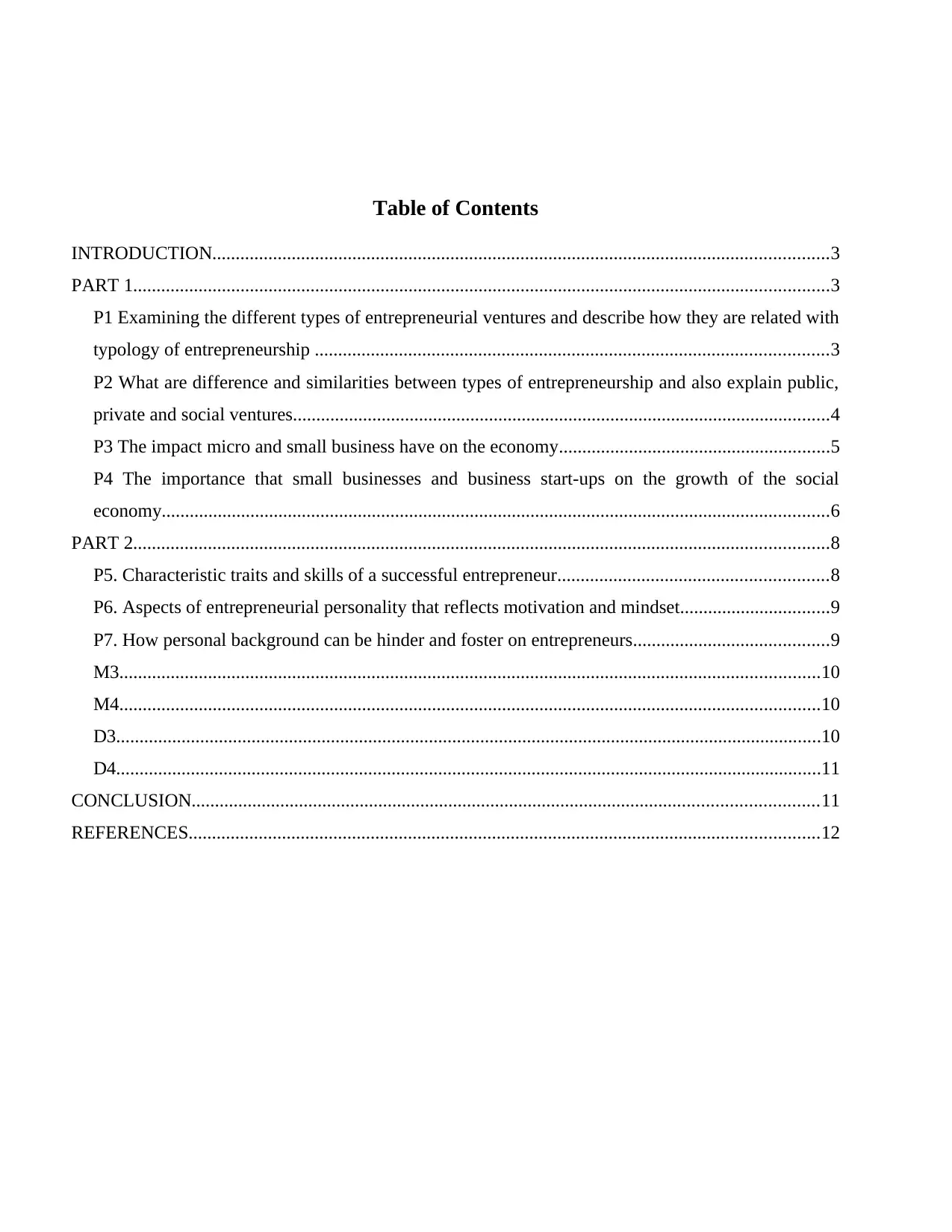
Table of Contents
INTRODUCTION....................................................................................................................................3
PART 1.....................................................................................................................................................3
P1 Examining the different types of entrepreneurial ventures and describe how they are related with
typology of entrepreneurship ..............................................................................................................3
P2 What are difference and similarities between types of entrepreneurship and also explain public,
private and social ventures...................................................................................................................4
P3 The impact micro and small business have on the economy..........................................................5
P4 The importance that small businesses and business start-ups on the growth of the social
economy...............................................................................................................................................6
PART 2.....................................................................................................................................................8
P5. Characteristic traits and skills of a successful entrepreneur..........................................................8
P6. Aspects of entrepreneurial personality that reflects motivation and mindset................................9
P7. How personal background can be hinder and foster on entrepreneurs..........................................9
M3......................................................................................................................................................10
M4......................................................................................................................................................10
D3.......................................................................................................................................................10
D4.......................................................................................................................................................11
CONCLUSION......................................................................................................................................11
REFERENCES.......................................................................................................................................12
INTRODUCTION....................................................................................................................................3
PART 1.....................................................................................................................................................3
P1 Examining the different types of entrepreneurial ventures and describe how they are related with
typology of entrepreneurship ..............................................................................................................3
P2 What are difference and similarities between types of entrepreneurship and also explain public,
private and social ventures...................................................................................................................4
P3 The impact micro and small business have on the economy..........................................................5
P4 The importance that small businesses and business start-ups on the growth of the social
economy...............................................................................................................................................6
PART 2.....................................................................................................................................................8
P5. Characteristic traits and skills of a successful entrepreneur..........................................................8
P6. Aspects of entrepreneurial personality that reflects motivation and mindset................................9
P7. How personal background can be hinder and foster on entrepreneurs..........................................9
M3......................................................................................................................................................10
M4......................................................................................................................................................10
D3.......................................................................................................................................................10
D4.......................................................................................................................................................11
CONCLUSION......................................................................................................................................11
REFERENCES.......................................................................................................................................12
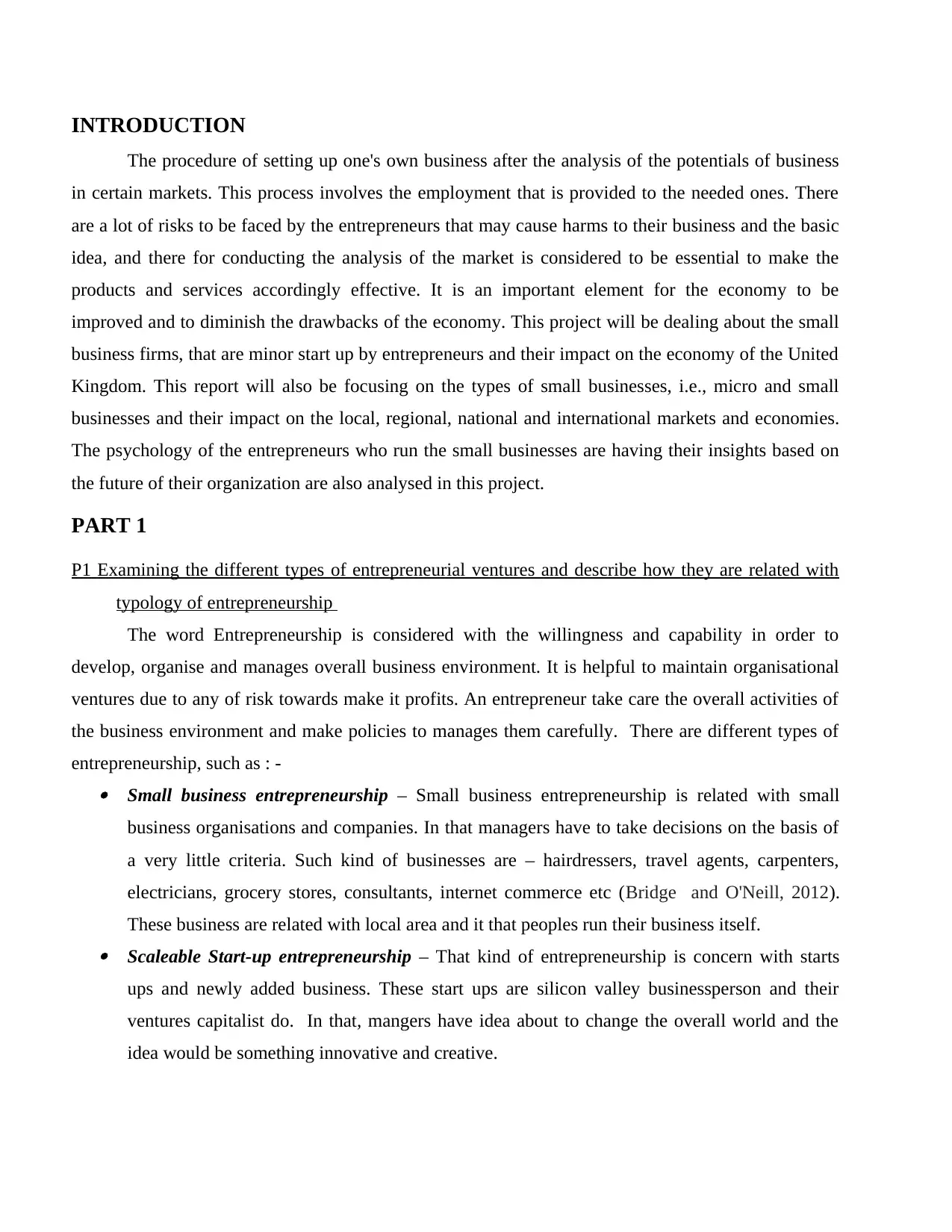
INTRODUCTION
The procedure of setting up one's own business after the analysis of the potentials of business
in certain markets. This process involves the employment that is provided to the needed ones. There
are a lot of risks to be faced by the entrepreneurs that may cause harms to their business and the basic
idea, and there for conducting the analysis of the market is considered to be essential to make the
products and services accordingly effective. It is an important element for the economy to be
improved and to diminish the drawbacks of the economy. This project will be dealing about the small
business firms, that are minor start up by entrepreneurs and their impact on the economy of the United
Kingdom. This report will also be focusing on the types of small businesses, i.e., micro and small
businesses and their impact on the local, regional, national and international markets and economies.
The psychology of the entrepreneurs who run the small businesses are having their insights based on
the future of their organization are also analysed in this project.
PART 1
P1 Examining the different types of entrepreneurial ventures and describe how they are related with
typology of entrepreneurship
The word Entrepreneurship is considered with the willingness and capability in order to
develop, organise and manages overall business environment. It is helpful to maintain organisational
ventures due to any of risk towards make it profits. An entrepreneur take care the overall activities of
the business environment and make policies to manages them carefully. There are different types of
entrepreneurship, such as : - Small business entrepreneurship – Small business entrepreneurship is related with small
business organisations and companies. In that managers have to take decisions on the basis of
a very little criteria. Such kind of businesses are – hairdressers, travel agents, carpenters,
electricians, grocery stores, consultants, internet commerce etc (Bridge and O'Neill, 2012).
These business are related with local area and it that peoples run their business itself. Scaleable Start-up entrepreneurship – That kind of entrepreneurship is concern with starts
ups and newly added business. These start ups are silicon valley businessperson and their
ventures capitalist do. In that, mangers have idea about to change the overall world and the
idea would be something innovative and creative.
The procedure of setting up one's own business after the analysis of the potentials of business
in certain markets. This process involves the employment that is provided to the needed ones. There
are a lot of risks to be faced by the entrepreneurs that may cause harms to their business and the basic
idea, and there for conducting the analysis of the market is considered to be essential to make the
products and services accordingly effective. It is an important element for the economy to be
improved and to diminish the drawbacks of the economy. This project will be dealing about the small
business firms, that are minor start up by entrepreneurs and their impact on the economy of the United
Kingdom. This report will also be focusing on the types of small businesses, i.e., micro and small
businesses and their impact on the local, regional, national and international markets and economies.
The psychology of the entrepreneurs who run the small businesses are having their insights based on
the future of their organization are also analysed in this project.
PART 1
P1 Examining the different types of entrepreneurial ventures and describe how they are related with
typology of entrepreneurship
The word Entrepreneurship is considered with the willingness and capability in order to
develop, organise and manages overall business environment. It is helpful to maintain organisational
ventures due to any of risk towards make it profits. An entrepreneur take care the overall activities of
the business environment and make policies to manages them carefully. There are different types of
entrepreneurship, such as : - Small business entrepreneurship – Small business entrepreneurship is related with small
business organisations and companies. In that managers have to take decisions on the basis of
a very little criteria. Such kind of businesses are – hairdressers, travel agents, carpenters,
electricians, grocery stores, consultants, internet commerce etc (Bridge and O'Neill, 2012).
These business are related with local area and it that peoples run their business itself. Scaleable Start-up entrepreneurship – That kind of entrepreneurship is concern with starts
ups and newly added business. These start ups are silicon valley businessperson and their
ventures capitalist do. In that, mangers have idea about to change the overall world and the
idea would be something innovative and creative.
⊘ This is a preview!⊘
Do you want full access?
Subscribe today to unlock all pages.

Trusted by 1+ million students worldwide
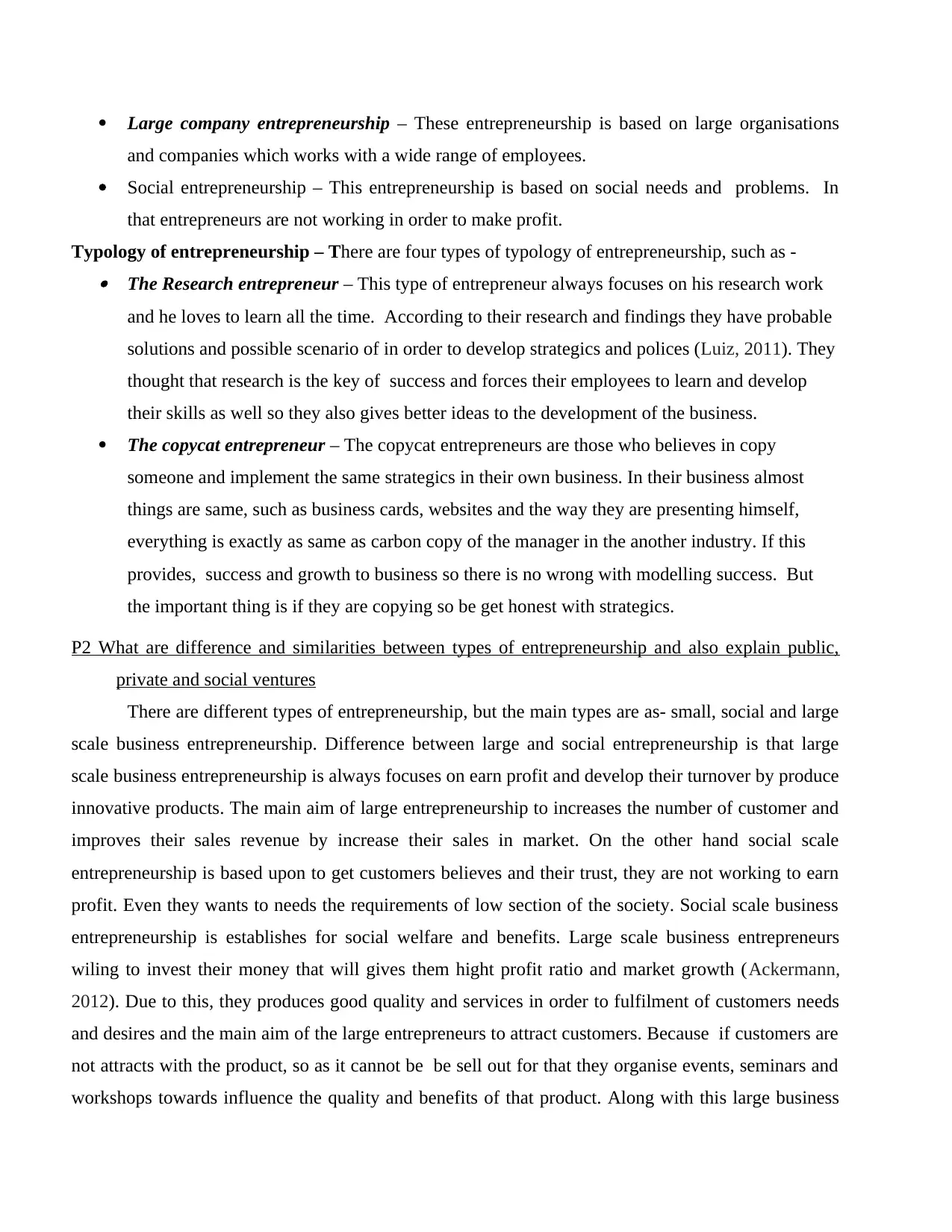
Large company entrepreneurship – These entrepreneurship is based on large organisations
and companies which works with a wide range of employees.
Social entrepreneurship – This entrepreneurship is based on social needs and problems. In
that entrepreneurs are not working in order to make profit.
Typology of entrepreneurship – There are four types of typology of entrepreneurship, such as - The Research entrepreneur – This type of entrepreneur always focuses on his research work
and he loves to learn all the time. According to their research and findings they have probable
solutions and possible scenario of in order to develop strategics and polices (Luiz, 2011). They
thought that research is the key of success and forces their employees to learn and develop
their skills as well so they also gives better ideas to the development of the business.
The copycat entrepreneur – The copycat entrepreneurs are those who believes in copy
someone and implement the same strategics in their own business. In their business almost
things are same, such as business cards, websites and the way they are presenting himself,
everything is exactly as same as carbon copy of the manager in the another industry. If this
provides, success and growth to business so there is no wrong with modelling success. But
the important thing is if they are copying so be get honest with strategics.
P2 What are difference and similarities between types of entrepreneurship and also explain public,
private and social ventures
There are different types of entrepreneurship, but the main types are as- small, social and large
scale business entrepreneurship. Difference between large and social entrepreneurship is that large
scale business entrepreneurship is always focuses on earn profit and develop their turnover by produce
innovative products. The main aim of large entrepreneurship to increases the number of customer and
improves their sales revenue by increase their sales in market. On the other hand social scale
entrepreneurship is based upon to get customers believes and their trust, they are not working to earn
profit. Even they wants to needs the requirements of low section of the society. Social scale business
entrepreneurship is establishes for social welfare and benefits. Large scale business entrepreneurs
wiling to invest their money that will gives them hight profit ratio and market growth (Ackermann,
2012). Due to this, they produces good quality and services in order to fulfilment of customers needs
and desires and the main aim of the large entrepreneurs to attract customers. Because if customers are
not attracts with the product, so as it cannot be be sell out for that they organise events, seminars and
workshops towards influence the quality and benefits of that product. Along with this large business
and companies which works with a wide range of employees.
Social entrepreneurship – This entrepreneurship is based on social needs and problems. In
that entrepreneurs are not working in order to make profit.
Typology of entrepreneurship – There are four types of typology of entrepreneurship, such as - The Research entrepreneur – This type of entrepreneur always focuses on his research work
and he loves to learn all the time. According to their research and findings they have probable
solutions and possible scenario of in order to develop strategics and polices (Luiz, 2011). They
thought that research is the key of success and forces their employees to learn and develop
their skills as well so they also gives better ideas to the development of the business.
The copycat entrepreneur – The copycat entrepreneurs are those who believes in copy
someone and implement the same strategics in their own business. In their business almost
things are same, such as business cards, websites and the way they are presenting himself,
everything is exactly as same as carbon copy of the manager in the another industry. If this
provides, success and growth to business so there is no wrong with modelling success. But
the important thing is if they are copying so be get honest with strategics.
P2 What are difference and similarities between types of entrepreneurship and also explain public,
private and social ventures
There are different types of entrepreneurship, but the main types are as- small, social and large
scale business entrepreneurship. Difference between large and social entrepreneurship is that large
scale business entrepreneurship is always focuses on earn profit and develop their turnover by produce
innovative products. The main aim of large entrepreneurship to increases the number of customer and
improves their sales revenue by increase their sales in market. On the other hand social scale
entrepreneurship is based upon to get customers believes and their trust, they are not working to earn
profit. Even they wants to needs the requirements of low section of the society. Social scale business
entrepreneurship is establishes for social welfare and benefits. Large scale business entrepreneurs
wiling to invest their money that will gives them hight profit ratio and market growth (Ackermann,
2012). Due to this, they produces good quality and services in order to fulfilment of customers needs
and desires and the main aim of the large entrepreneurs to attract customers. Because if customers are
not attracts with the product, so as it cannot be be sell out for that they organise events, seminars and
workshops towards influence the quality and benefits of that product. Along with this large business
Paraphrase This Document
Need a fresh take? Get an instant paraphrase of this document with our AI Paraphraser
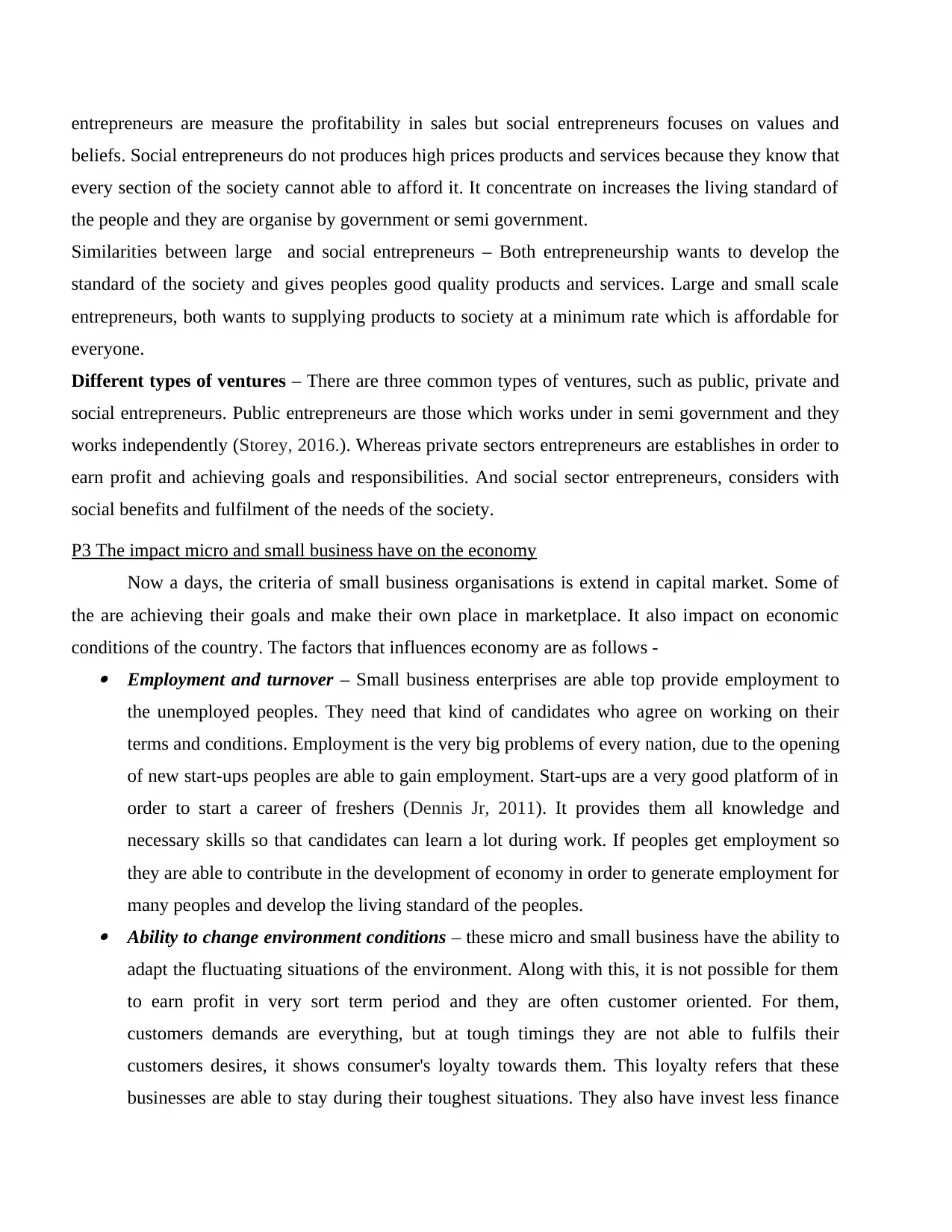
entrepreneurs are measure the profitability in sales but social entrepreneurs focuses on values and
beliefs. Social entrepreneurs do not produces high prices products and services because they know that
every section of the society cannot able to afford it. It concentrate on increases the living standard of
the people and they are organise by government or semi government.
Similarities between large and social entrepreneurs – Both entrepreneurship wants to develop the
standard of the society and gives peoples good quality products and services. Large and small scale
entrepreneurs, both wants to supplying products to society at a minimum rate which is affordable for
everyone.
Different types of ventures – There are three common types of ventures, such as public, private and
social entrepreneurs. Public entrepreneurs are those which works under in semi government and they
works independently (Storey, 2016.). Whereas private sectors entrepreneurs are establishes in order to
earn profit and achieving goals and responsibilities. And social sector entrepreneurs, considers with
social benefits and fulfilment of the needs of the society.
P3 The impact micro and small business have on the economy
Now a days, the criteria of small business organisations is extend in capital market. Some of
the are achieving their goals and make their own place in marketplace. It also impact on economic
conditions of the country. The factors that influences economy are as follows - Employment and turnover – Small business enterprises are able top provide employment to
the unemployed peoples. They need that kind of candidates who agree on working on their
terms and conditions. Employment is the very big problems of every nation, due to the opening
of new start-ups peoples are able to gain employment. Start-ups are a very good platform of in
order to start a career of freshers (Dennis Jr, 2011). It provides them all knowledge and
necessary skills so that candidates can learn a lot during work. If peoples get employment so
they are able to contribute in the development of economy in order to generate employment for
many peoples and develop the living standard of the peoples. Ability to change environment conditions – these micro and small business have the ability to
adapt the fluctuating situations of the environment. Along with this, it is not possible for them
to earn profit in very sort term period and they are often customer oriented. For them,
customers demands are everything, but at tough timings they are not able to fulfils their
customers desires, it shows consumer's loyalty towards them. This loyalty refers that these
businesses are able to stay during their toughest situations. They also have invest less finance
beliefs. Social entrepreneurs do not produces high prices products and services because they know that
every section of the society cannot able to afford it. It concentrate on increases the living standard of
the people and they are organise by government or semi government.
Similarities between large and social entrepreneurs – Both entrepreneurship wants to develop the
standard of the society and gives peoples good quality products and services. Large and small scale
entrepreneurs, both wants to supplying products to society at a minimum rate which is affordable for
everyone.
Different types of ventures – There are three common types of ventures, such as public, private and
social entrepreneurs. Public entrepreneurs are those which works under in semi government and they
works independently (Storey, 2016.). Whereas private sectors entrepreneurs are establishes in order to
earn profit and achieving goals and responsibilities. And social sector entrepreneurs, considers with
social benefits and fulfilment of the needs of the society.
P3 The impact micro and small business have on the economy
Now a days, the criteria of small business organisations is extend in capital market. Some of
the are achieving their goals and make their own place in marketplace. It also impact on economic
conditions of the country. The factors that influences economy are as follows - Employment and turnover – Small business enterprises are able top provide employment to
the unemployed peoples. They need that kind of candidates who agree on working on their
terms and conditions. Employment is the very big problems of every nation, due to the opening
of new start-ups peoples are able to gain employment. Start-ups are a very good platform of in
order to start a career of freshers (Dennis Jr, 2011). It provides them all knowledge and
necessary skills so that candidates can learn a lot during work. If peoples get employment so
they are able to contribute in the development of economy in order to generate employment for
many peoples and develop the living standard of the peoples. Ability to change environment conditions – these micro and small business have the ability to
adapt the fluctuating situations of the environment. Along with this, it is not possible for them
to earn profit in very sort term period and they are often customer oriented. For them,
customers demands are everything, but at tough timings they are not able to fulfils their
customers desires, it shows consumer's loyalty towards them. This loyalty refers that these
businesses are able to stay during their toughest situations. They also have invest less finance
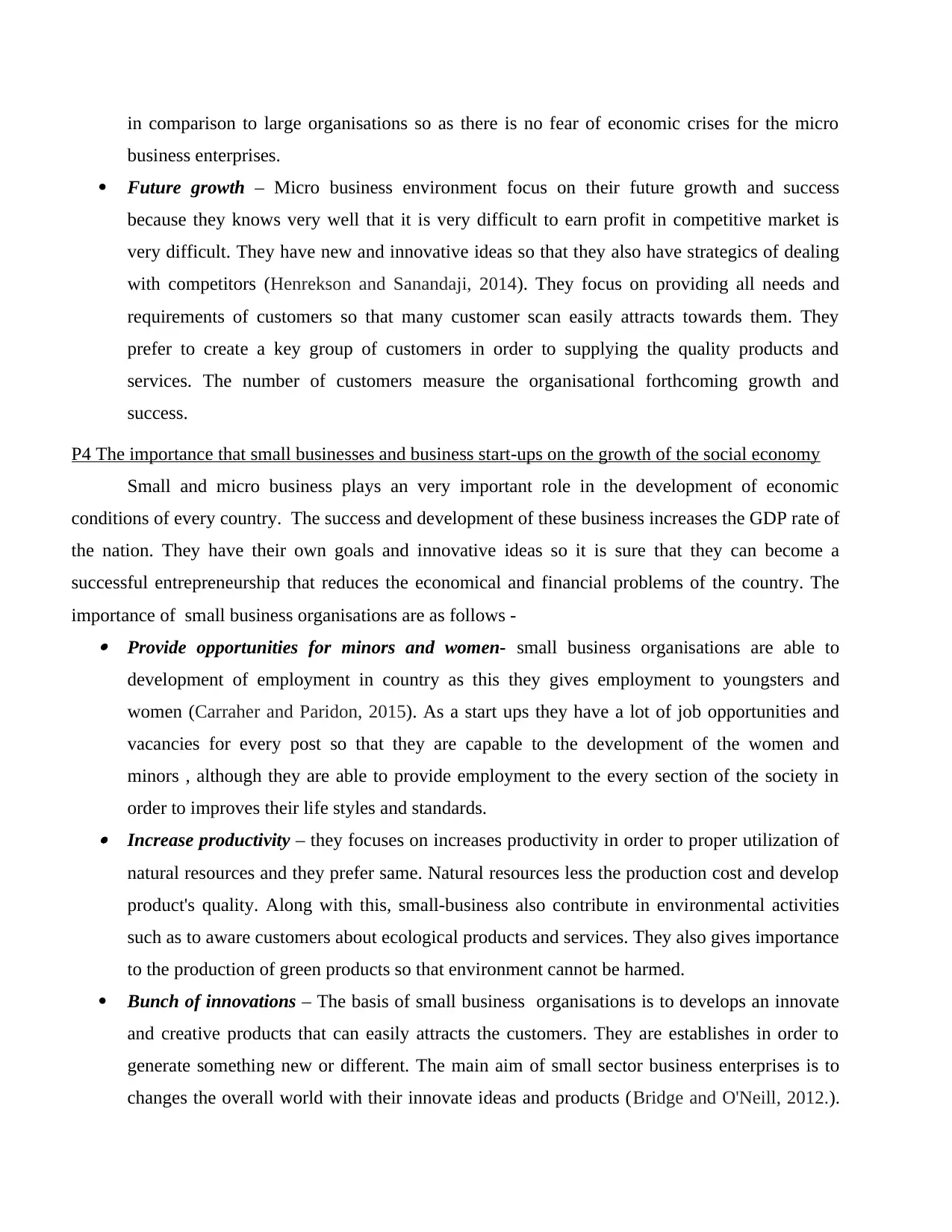
in comparison to large organisations so as there is no fear of economic crises for the micro
business enterprises.
Future growth – Micro business environment focus on their future growth and success
because they knows very well that it is very difficult to earn profit in competitive market is
very difficult. They have new and innovative ideas so that they also have strategics of dealing
with competitors (Henrekson and Sanandaji, 2014). They focus on providing all needs and
requirements of customers so that many customer scan easily attracts towards them. They
prefer to create a key group of customers in order to supplying the quality products and
services. The number of customers measure the organisational forthcoming growth and
success.
P4 The importance that small businesses and business start-ups on the growth of the social economy
Small and micro business plays an very important role in the development of economic
conditions of every country. The success and development of these business increases the GDP rate of
the nation. They have their own goals and innovative ideas so it is sure that they can become a
successful entrepreneurship that reduces the economical and financial problems of the country. The
importance of small business organisations are as follows - Provide opportunities for minors and women- small business organisations are able to
development of employment in country as this they gives employment to youngsters and
women (Carraher and Paridon, 2015). As a start ups they have a lot of job opportunities and
vacancies for every post so that they are capable to the development of the women and
minors , although they are able to provide employment to the every section of the society in
order to improves their life styles and standards. Increase productivity – they focuses on increases productivity in order to proper utilization of
natural resources and they prefer same. Natural resources less the production cost and develop
product's quality. Along with this, small-business also contribute in environmental activities
such as to aware customers about ecological products and services. They also gives importance
to the production of green products so that environment cannot be harmed.
Bunch of innovations – The basis of small business organisations is to develops an innovate
and creative products that can easily attracts the customers. They are establishes in order to
generate something new or different. The main aim of small sector business enterprises is to
changes the overall world with their innovate ideas and products (Bridge and O'Neill, 2012.).
business enterprises.
Future growth – Micro business environment focus on their future growth and success
because they knows very well that it is very difficult to earn profit in competitive market is
very difficult. They have new and innovative ideas so that they also have strategics of dealing
with competitors (Henrekson and Sanandaji, 2014). They focus on providing all needs and
requirements of customers so that many customer scan easily attracts towards them. They
prefer to create a key group of customers in order to supplying the quality products and
services. The number of customers measure the organisational forthcoming growth and
success.
P4 The importance that small businesses and business start-ups on the growth of the social economy
Small and micro business plays an very important role in the development of economic
conditions of every country. The success and development of these business increases the GDP rate of
the nation. They have their own goals and innovative ideas so it is sure that they can become a
successful entrepreneurship that reduces the economical and financial problems of the country. The
importance of small business organisations are as follows - Provide opportunities for minors and women- small business organisations are able to
development of employment in country as this they gives employment to youngsters and
women (Carraher and Paridon, 2015). As a start ups they have a lot of job opportunities and
vacancies for every post so that they are capable to the development of the women and
minors , although they are able to provide employment to the every section of the society in
order to improves their life styles and standards. Increase productivity – they focuses on increases productivity in order to proper utilization of
natural resources and they prefer same. Natural resources less the production cost and develop
product's quality. Along with this, small-business also contribute in environmental activities
such as to aware customers about ecological products and services. They also gives importance
to the production of green products so that environment cannot be harmed.
Bunch of innovations – The basis of small business organisations is to develops an innovate
and creative products that can easily attracts the customers. They are establishes in order to
generate something new or different. The main aim of small sector business enterprises is to
changes the overall world with their innovate ideas and products (Bridge and O'Neill, 2012.).
⊘ This is a preview!⊘
Do you want full access?
Subscribe today to unlock all pages.

Trusted by 1+ million students worldwide
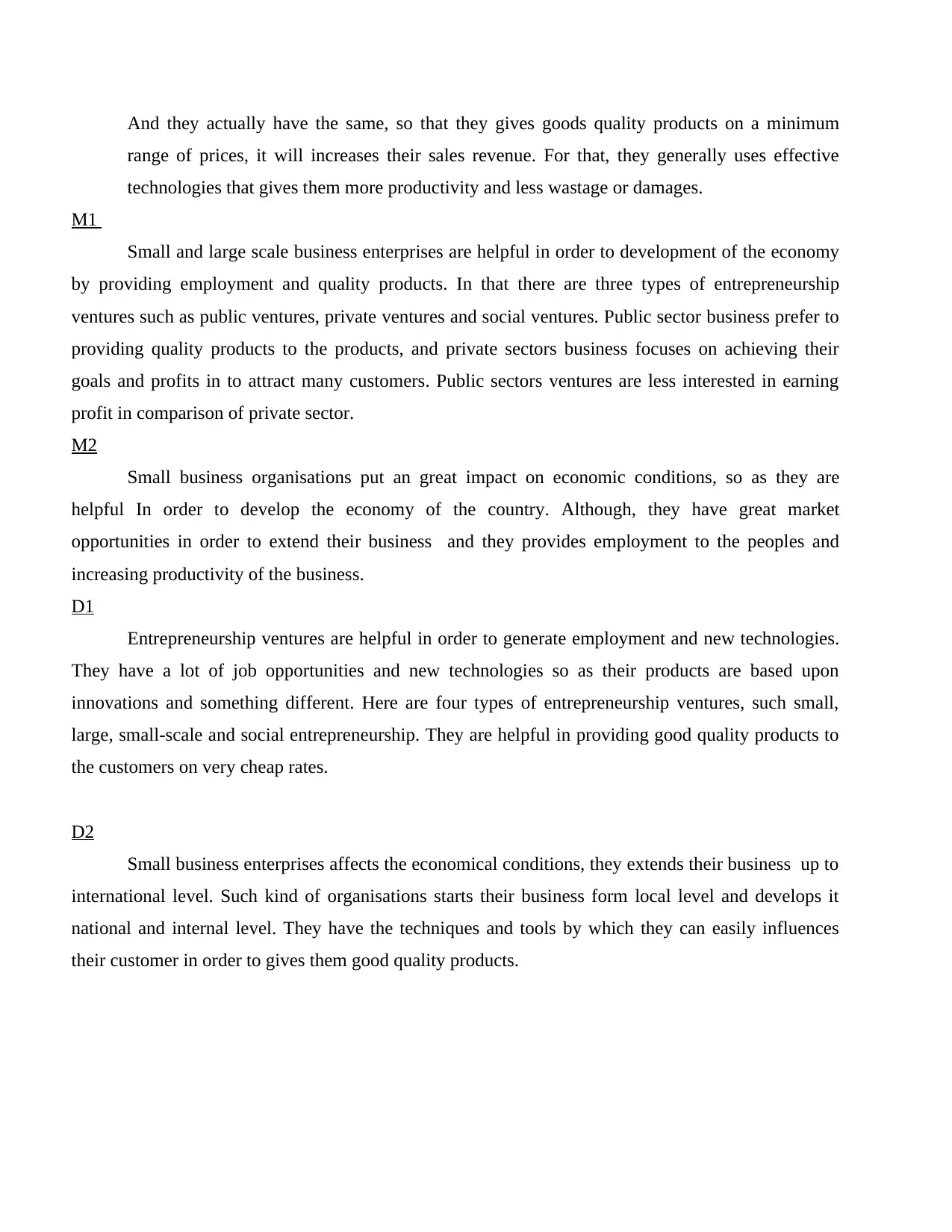
And they actually have the same, so that they gives goods quality products on a minimum
range of prices, it will increases their sales revenue. For that, they generally uses effective
technologies that gives them more productivity and less wastage or damages.
M1
Small and large scale business enterprises are helpful in order to development of the economy
by providing employment and quality products. In that there are three types of entrepreneurship
ventures such as public ventures, private ventures and social ventures. Public sector business prefer to
providing quality products to the products, and private sectors business focuses on achieving their
goals and profits in to attract many customers. Public sectors ventures are less interested in earning
profit in comparison of private sector.
M2
Small business organisations put an great impact on economic conditions, so as they are
helpful In order to develop the economy of the country. Although, they have great market
opportunities in order to extend their business and they provides employment to the peoples and
increasing productivity of the business.
D1
Entrepreneurship ventures are helpful in order to generate employment and new technologies.
They have a lot of job opportunities and new technologies so as their products are based upon
innovations and something different. Here are four types of entrepreneurship ventures, such small,
large, small-scale and social entrepreneurship. They are helpful in providing good quality products to
the customers on very cheap rates.
D2
Small business enterprises affects the economical conditions, they extends their business up to
international level. Such kind of organisations starts their business form local level and develops it
national and internal level. They have the techniques and tools by which they can easily influences
their customer in order to gives them good quality products.
range of prices, it will increases their sales revenue. For that, they generally uses effective
technologies that gives them more productivity and less wastage or damages.
M1
Small and large scale business enterprises are helpful in order to development of the economy
by providing employment and quality products. In that there are three types of entrepreneurship
ventures such as public ventures, private ventures and social ventures. Public sector business prefer to
providing quality products to the products, and private sectors business focuses on achieving their
goals and profits in to attract many customers. Public sectors ventures are less interested in earning
profit in comparison of private sector.
M2
Small business organisations put an great impact on economic conditions, so as they are
helpful In order to develop the economy of the country. Although, they have great market
opportunities in order to extend their business and they provides employment to the peoples and
increasing productivity of the business.
D1
Entrepreneurship ventures are helpful in order to generate employment and new technologies.
They have a lot of job opportunities and new technologies so as their products are based upon
innovations and something different. Here are four types of entrepreneurship ventures, such small,
large, small-scale and social entrepreneurship. They are helpful in providing good quality products to
the customers on very cheap rates.
D2
Small business enterprises affects the economical conditions, they extends their business up to
international level. Such kind of organisations starts their business form local level and develops it
national and internal level. They have the techniques and tools by which they can easily influences
their customer in order to gives them good quality products.
Paraphrase This Document
Need a fresh take? Get an instant paraphrase of this document with our AI Paraphraser
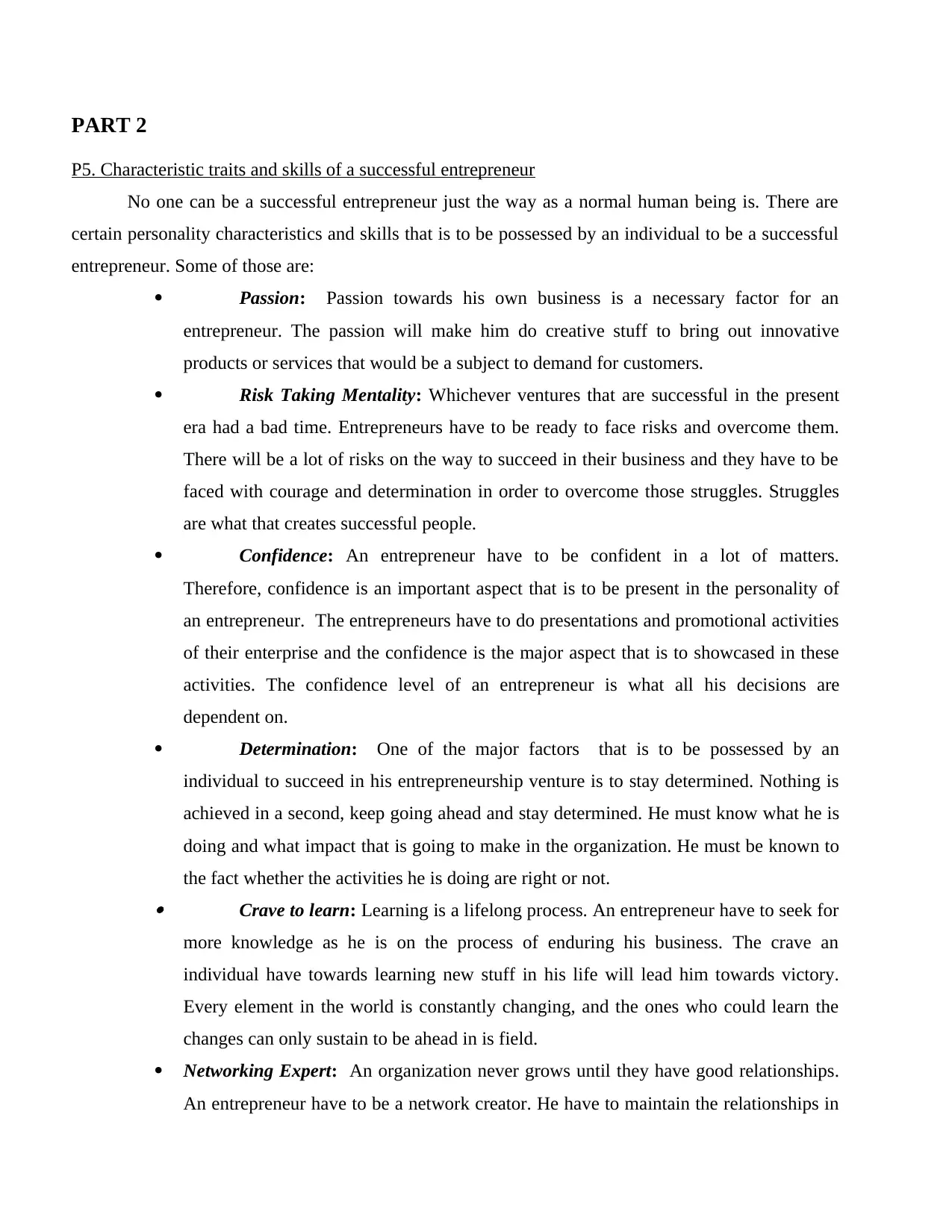
PART 2
P5. Characteristic traits and skills of a successful entrepreneur
No one can be a successful entrepreneur just the way as a normal human being is. There are
certain personality characteristics and skills that is to be possessed by an individual to be a successful
entrepreneur. Some of those are:
Passion: Passion towards his own business is a necessary factor for an
entrepreneur. The passion will make him do creative stuff to bring out innovative
products or services that would be a subject to demand for customers.
Risk Taking Mentality: Whichever ventures that are successful in the present
era had a bad time. Entrepreneurs have to be ready to face risks and overcome them.
There will be a lot of risks on the way to succeed in their business and they have to be
faced with courage and determination in order to overcome those struggles. Struggles
are what that creates successful people.
Confidence: An entrepreneur have to be confident in a lot of matters.
Therefore, confidence is an important aspect that is to be present in the personality of
an entrepreneur. The entrepreneurs have to do presentations and promotional activities
of their enterprise and the confidence is the major aspect that is to showcased in these
activities. The confidence level of an entrepreneur is what all his decisions are
dependent on.
Determination: One of the major factors that is to be possessed by an
individual to succeed in his entrepreneurship venture is to stay determined. Nothing is
achieved in a second, keep going ahead and stay determined. He must know what he is
doing and what impact that is going to make in the organization. He must be known to
the fact whether the activities he is doing are right or not.
Crave to learn: Learning is a lifelong process. An entrepreneur have to seek for
more knowledge as he is on the process of enduring his business. The crave an
individual have towards learning new stuff in his life will lead him towards victory.
Every element in the world is constantly changing, and the ones who could learn the
changes can only sustain to be ahead in is field.
Networking Expert: An organization never grows until they have good relationships.
An entrepreneur have to be a network creator. He have to maintain the relationships in
P5. Characteristic traits and skills of a successful entrepreneur
No one can be a successful entrepreneur just the way as a normal human being is. There are
certain personality characteristics and skills that is to be possessed by an individual to be a successful
entrepreneur. Some of those are:
Passion: Passion towards his own business is a necessary factor for an
entrepreneur. The passion will make him do creative stuff to bring out innovative
products or services that would be a subject to demand for customers.
Risk Taking Mentality: Whichever ventures that are successful in the present
era had a bad time. Entrepreneurs have to be ready to face risks and overcome them.
There will be a lot of risks on the way to succeed in their business and they have to be
faced with courage and determination in order to overcome those struggles. Struggles
are what that creates successful people.
Confidence: An entrepreneur have to be confident in a lot of matters.
Therefore, confidence is an important aspect that is to be present in the personality of
an entrepreneur. The entrepreneurs have to do presentations and promotional activities
of their enterprise and the confidence is the major aspect that is to showcased in these
activities. The confidence level of an entrepreneur is what all his decisions are
dependent on.
Determination: One of the major factors that is to be possessed by an
individual to succeed in his entrepreneurship venture is to stay determined. Nothing is
achieved in a second, keep going ahead and stay determined. He must know what he is
doing and what impact that is going to make in the organization. He must be known to
the fact whether the activities he is doing are right or not.
Crave to learn: Learning is a lifelong process. An entrepreneur have to seek for
more knowledge as he is on the process of enduring his business. The crave an
individual have towards learning new stuff in his life will lead him towards victory.
Every element in the world is constantly changing, and the ones who could learn the
changes can only sustain to be ahead in is field.
Networking Expert: An organization never grows until they have good relationships.
An entrepreneur have to be a network creator. He have to maintain the relationships in
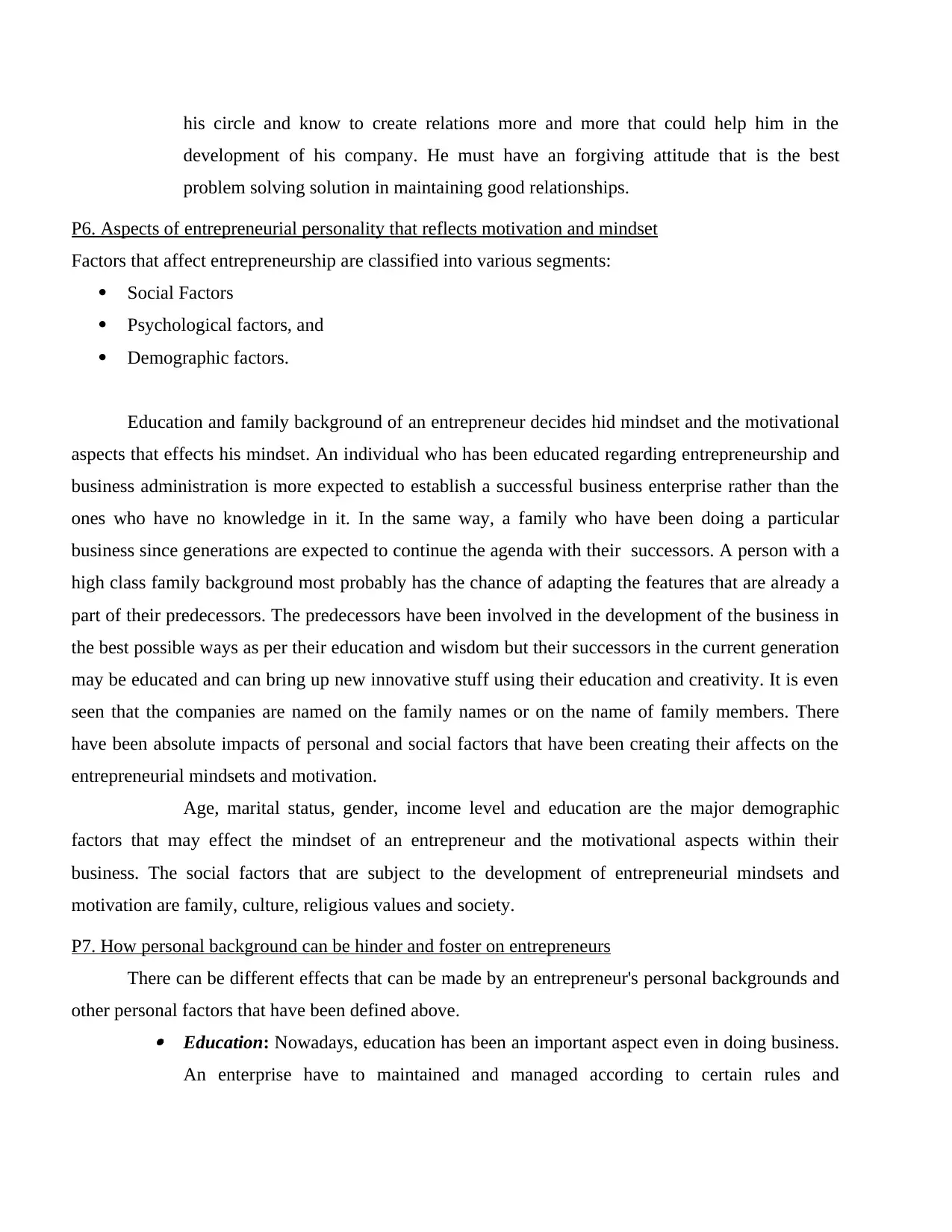
his circle and know to create relations more and more that could help him in the
development of his company. He must have an forgiving attitude that is the best
problem solving solution in maintaining good relationships.
P6. Aspects of entrepreneurial personality that reflects motivation and mindset
Factors that affect entrepreneurship are classified into various segments:
Social Factors
Psychological factors, and
Demographic factors.
Education and family background of an entrepreneur decides hid mindset and the motivational
aspects that effects his mindset. An individual who has been educated regarding entrepreneurship and
business administration is more expected to establish a successful business enterprise rather than the
ones who have no knowledge in it. In the same way, a family who have been doing a particular
business since generations are expected to continue the agenda with their successors. A person with a
high class family background most probably has the chance of adapting the features that are already a
part of their predecessors. The predecessors have been involved in the development of the business in
the best possible ways as per their education and wisdom but their successors in the current generation
may be educated and can bring up new innovative stuff using their education and creativity. It is even
seen that the companies are named on the family names or on the name of family members. There
have been absolute impacts of personal and social factors that have been creating their affects on the
entrepreneurial mindsets and motivation.
Age, marital status, gender, income level and education are the major demographic
factors that may effect the mindset of an entrepreneur and the motivational aspects within their
business. The social factors that are subject to the development of entrepreneurial mindsets and
motivation are family, culture, religious values and society.
P7. How personal background can be hinder and foster on entrepreneurs
There can be different effects that can be made by an entrepreneur's personal backgrounds and
other personal factors that have been defined above.
Education: Nowadays, education has been an important aspect even in doing business.
An enterprise have to maintained and managed according to certain rules and
development of his company. He must have an forgiving attitude that is the best
problem solving solution in maintaining good relationships.
P6. Aspects of entrepreneurial personality that reflects motivation and mindset
Factors that affect entrepreneurship are classified into various segments:
Social Factors
Psychological factors, and
Demographic factors.
Education and family background of an entrepreneur decides hid mindset and the motivational
aspects that effects his mindset. An individual who has been educated regarding entrepreneurship and
business administration is more expected to establish a successful business enterprise rather than the
ones who have no knowledge in it. In the same way, a family who have been doing a particular
business since generations are expected to continue the agenda with their successors. A person with a
high class family background most probably has the chance of adapting the features that are already a
part of their predecessors. The predecessors have been involved in the development of the business in
the best possible ways as per their education and wisdom but their successors in the current generation
may be educated and can bring up new innovative stuff using their education and creativity. It is even
seen that the companies are named on the family names or on the name of family members. There
have been absolute impacts of personal and social factors that have been creating their affects on the
entrepreneurial mindsets and motivation.
Age, marital status, gender, income level and education are the major demographic
factors that may effect the mindset of an entrepreneur and the motivational aspects within their
business. The social factors that are subject to the development of entrepreneurial mindsets and
motivation are family, culture, religious values and society.
P7. How personal background can be hinder and foster on entrepreneurs
There can be different effects that can be made by an entrepreneur's personal backgrounds and
other personal factors that have been defined above.
Education: Nowadays, education has been an important aspect even in doing business.
An enterprise have to maintained and managed according to certain rules and
⊘ This is a preview!⊘
Do you want full access?
Subscribe today to unlock all pages.

Trusted by 1+ million students worldwide
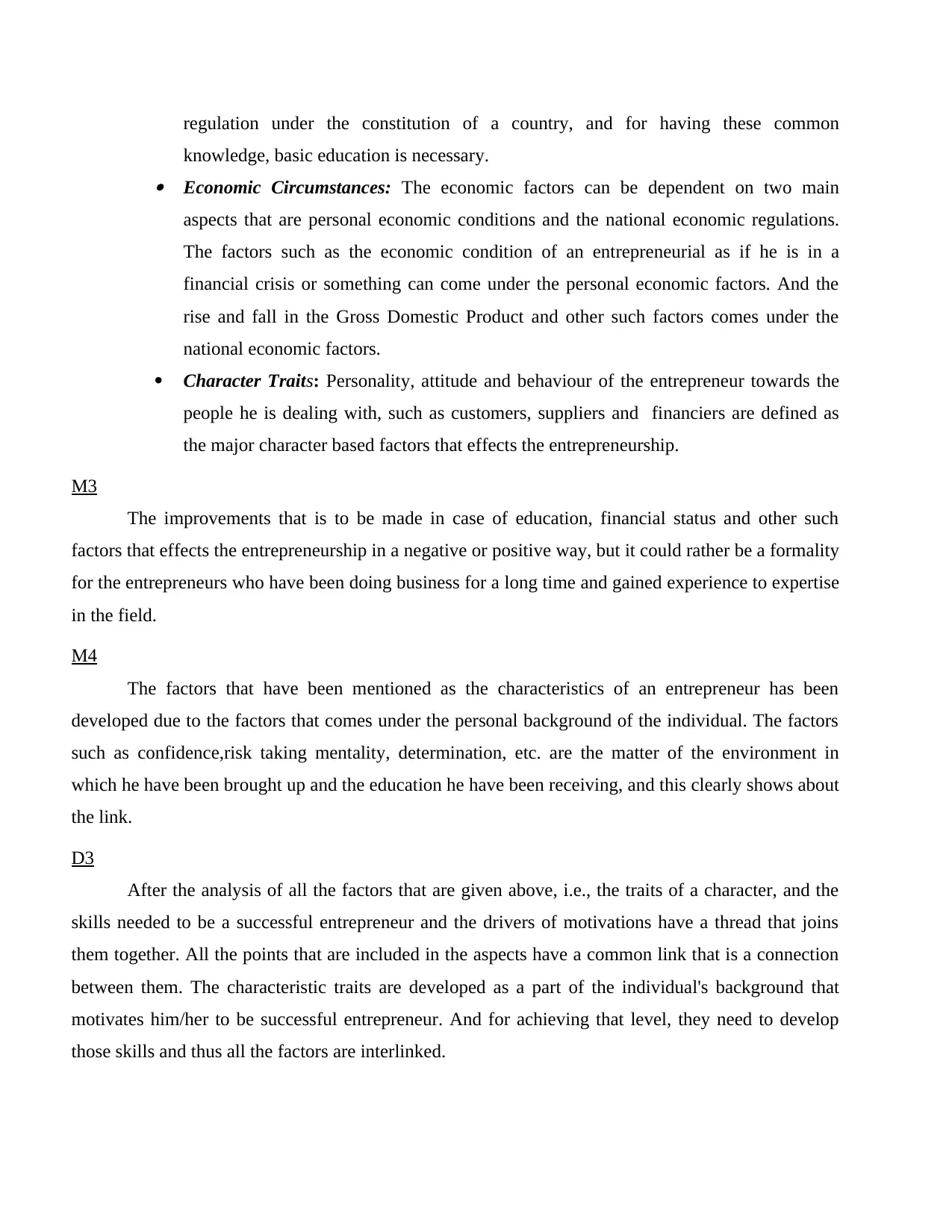
regulation under the constitution of a country, and for having these common
knowledge, basic education is necessary.
Economic Circumstances: The economic factors can be dependent on two main
aspects that are personal economic conditions and the national economic regulations.
The factors such as the economic condition of an entrepreneurial as if he is in a
financial crisis or something can come under the personal economic factors. And the
rise and fall in the Gross Domestic Product and other such factors comes under the
national economic factors.
Character Traits: Personality, attitude and behaviour of the entrepreneur towards the
people he is dealing with, such as customers, suppliers and financiers are defined as
the major character based factors that effects the entrepreneurship.
M3
The improvements that is to be made in case of education, financial status and other such
factors that effects the entrepreneurship in a negative or positive way, but it could rather be a formality
for the entrepreneurs who have been doing business for a long time and gained experience to expertise
in the field.
M4
The factors that have been mentioned as the characteristics of an entrepreneur has been
developed due to the factors that comes under the personal background of the individual. The factors
such as confidence,risk taking mentality, determination, etc. are the matter of the environment in
which he have been brought up and the education he have been receiving, and this clearly shows about
the link.
D3
After the analysis of all the factors that are given above, i.e., the traits of a character, and the
skills needed to be a successful entrepreneur and the drivers of motivations have a thread that joins
them together. All the points that are included in the aspects have a common link that is a connection
between them. The characteristic traits are developed as a part of the individual's background that
motivates him/her to be successful entrepreneur. And for achieving that level, they need to develop
those skills and thus all the factors are interlinked.
knowledge, basic education is necessary.
Economic Circumstances: The economic factors can be dependent on two main
aspects that are personal economic conditions and the national economic regulations.
The factors such as the economic condition of an entrepreneurial as if he is in a
financial crisis or something can come under the personal economic factors. And the
rise and fall in the Gross Domestic Product and other such factors comes under the
national economic factors.
Character Traits: Personality, attitude and behaviour of the entrepreneur towards the
people he is dealing with, such as customers, suppliers and financiers are defined as
the major character based factors that effects the entrepreneurship.
M3
The improvements that is to be made in case of education, financial status and other such
factors that effects the entrepreneurship in a negative or positive way, but it could rather be a formality
for the entrepreneurs who have been doing business for a long time and gained experience to expertise
in the field.
M4
The factors that have been mentioned as the characteristics of an entrepreneur has been
developed due to the factors that comes under the personal background of the individual. The factors
such as confidence,risk taking mentality, determination, etc. are the matter of the environment in
which he have been brought up and the education he have been receiving, and this clearly shows about
the link.
D3
After the analysis of all the factors that are given above, i.e., the traits of a character, and the
skills needed to be a successful entrepreneur and the drivers of motivations have a thread that joins
them together. All the points that are included in the aspects have a common link that is a connection
between them. The characteristic traits are developed as a part of the individual's background that
motivates him/her to be successful entrepreneur. And for achieving that level, they need to develop
those skills and thus all the factors are interlinked.
Paraphrase This Document
Need a fresh take? Get an instant paraphrase of this document with our AI Paraphraser
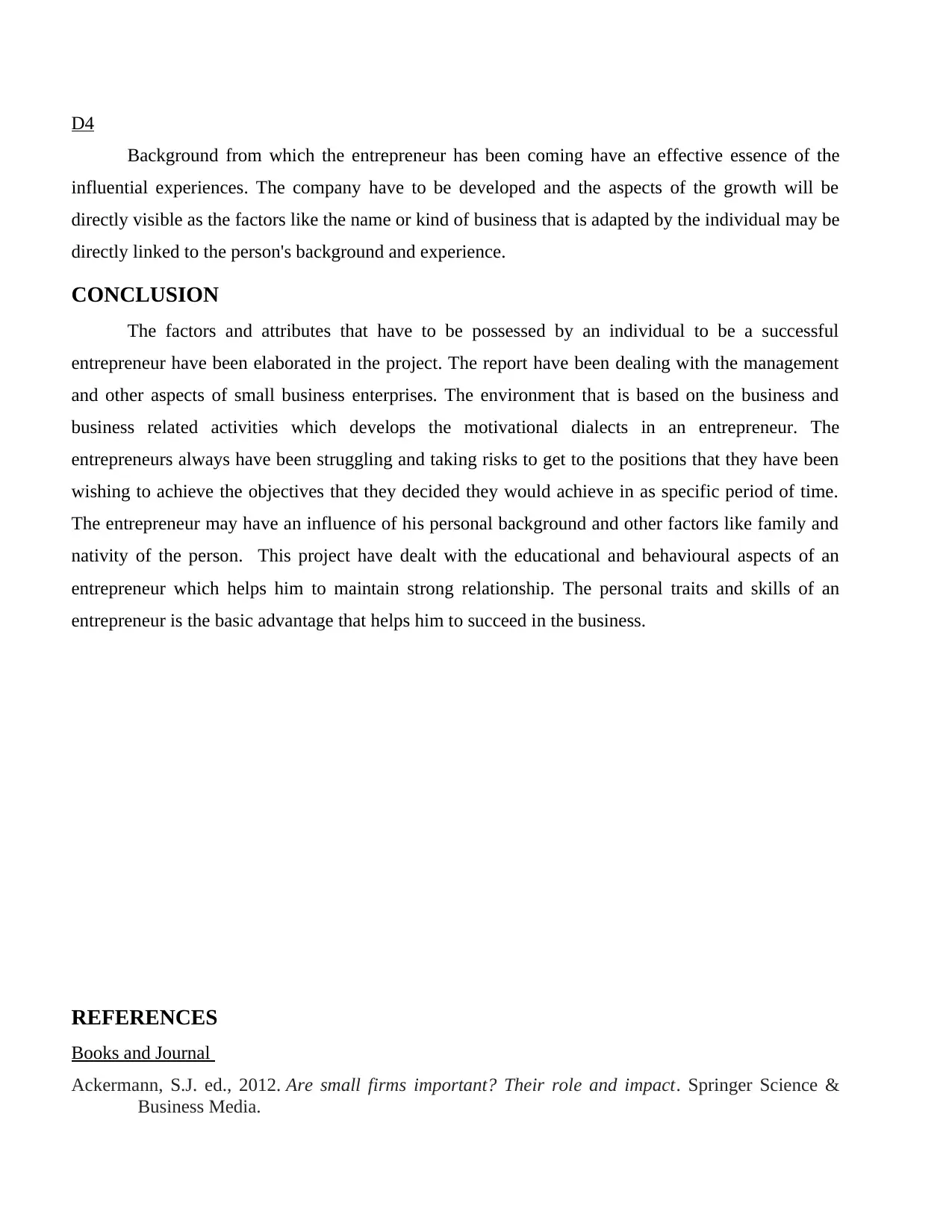
D4
Background from which the entrepreneur has been coming have an effective essence of the
influential experiences. The company have to be developed and the aspects of the growth will be
directly visible as the factors like the name or kind of business that is adapted by the individual may be
directly linked to the person's background and experience.
CONCLUSION
The factors and attributes that have to be possessed by an individual to be a successful
entrepreneur have been elaborated in the project. The report have been dealing with the management
and other aspects of small business enterprises. The environment that is based on the business and
business related activities which develops the motivational dialects in an entrepreneur. The
entrepreneurs always have been struggling and taking risks to get to the positions that they have been
wishing to achieve the objectives that they decided they would achieve in as specific period of time.
The entrepreneur may have an influence of his personal background and other factors like family and
nativity of the person. This project have dealt with the educational and behavioural aspects of an
entrepreneur which helps him to maintain strong relationship. The personal traits and skills of an
entrepreneur is the basic advantage that helps him to succeed in the business.
REFERENCES
Books and Journal
Ackermann, S.J. ed., 2012. Are small firms important? Their role and impact. Springer Science &
Business Media.
Background from which the entrepreneur has been coming have an effective essence of the
influential experiences. The company have to be developed and the aspects of the growth will be
directly visible as the factors like the name or kind of business that is adapted by the individual may be
directly linked to the person's background and experience.
CONCLUSION
The factors and attributes that have to be possessed by an individual to be a successful
entrepreneur have been elaborated in the project. The report have been dealing with the management
and other aspects of small business enterprises. The environment that is based on the business and
business related activities which develops the motivational dialects in an entrepreneur. The
entrepreneurs always have been struggling and taking risks to get to the positions that they have been
wishing to achieve the objectives that they decided they would achieve in as specific period of time.
The entrepreneur may have an influence of his personal background and other factors like family and
nativity of the person. This project have dealt with the educational and behavioural aspects of an
entrepreneur which helps him to maintain strong relationship. The personal traits and skills of an
entrepreneur is the basic advantage that helps him to succeed in the business.
REFERENCES
Books and Journal
Ackermann, S.J. ed., 2012. Are small firms important? Their role and impact. Springer Science &
Business Media.
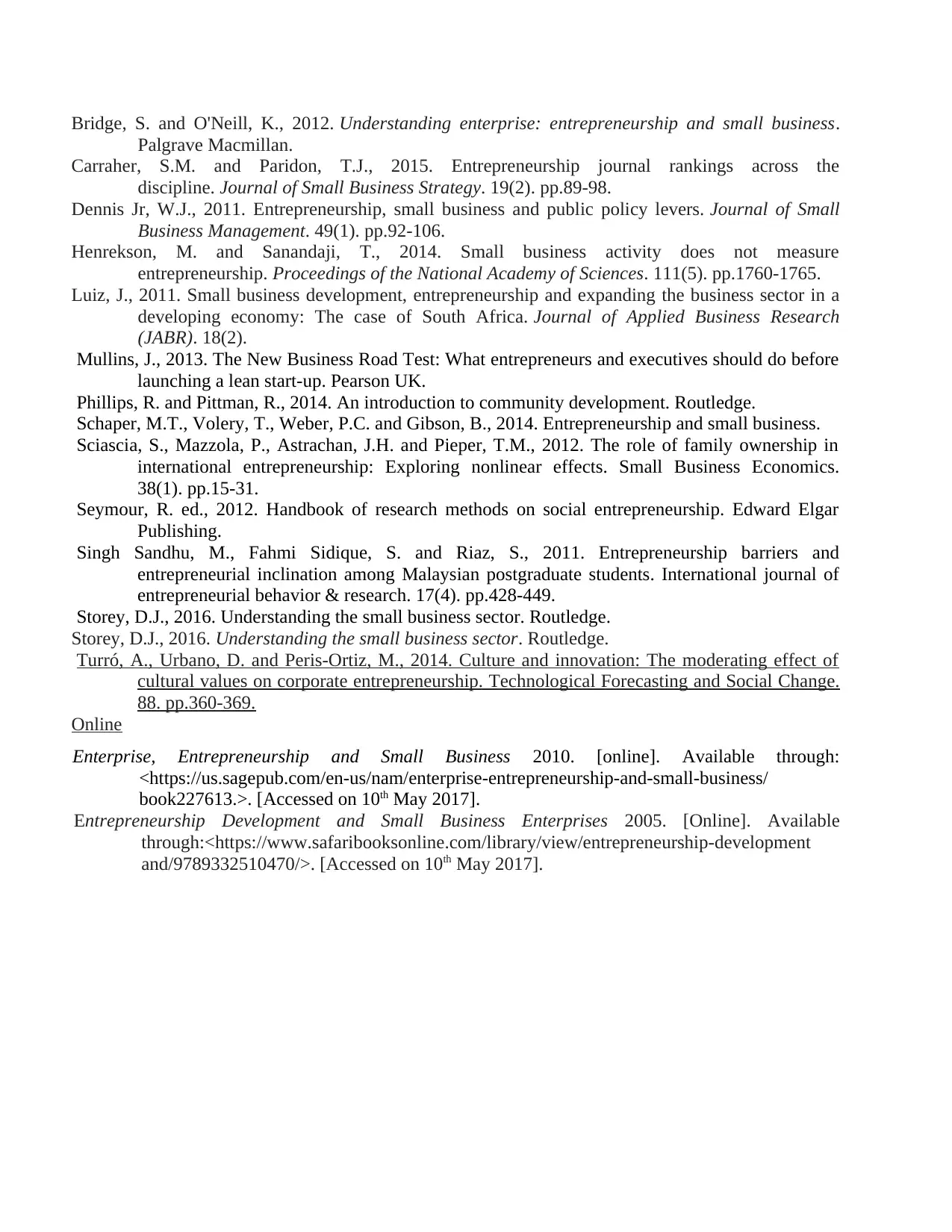
Bridge, S. and O'Neill, K., 2012. Understanding enterprise: entrepreneurship and small business.
Palgrave Macmillan.
Carraher, S.M. and Paridon, T.J., 2015. Entrepreneurship journal rankings across the
discipline. Journal of Small Business Strategy. 19(2). pp.89-98.
Dennis Jr, W.J., 2011. Entrepreneurship, small business and public policy levers. Journal of Small
Business Management. 49(1). pp.92-106.
Henrekson, M. and Sanandaji, T., 2014. Small business activity does not measure
entrepreneurship. Proceedings of the National Academy of Sciences. 111(5). pp.1760-1765.
Luiz, J., 2011. Small business development, entrepreneurship and expanding the business sector in a
developing economy: The case of South Africa. Journal of Applied Business Research
(JABR). 18(2).
Mullins, J., 2013. The New Business Road Test: What entrepreneurs and executives should do before
launching a lean start-up. Pearson UK.
Phillips, R. and Pittman, R., 2014. An introduction to community development. Routledge.
Schaper, M.T., Volery, T., Weber, P.C. and Gibson, B., 2014. Entrepreneurship and small business.
Sciascia, S., Mazzola, P., Astrachan, J.H. and Pieper, T.M., 2012. The role of family ownership in
international entrepreneurship: Exploring nonlinear effects. Small Business Economics.
38(1). pp.15-31.
Seymour, R. ed., 2012. Handbook of research methods on social entrepreneurship. Edward Elgar
Publishing.
Singh Sandhu, M., Fahmi Sidique, S. and Riaz, S., 2011. Entrepreneurship barriers and
entrepreneurial inclination among Malaysian postgraduate students. International journal of
entrepreneurial behavior & research. 17(4). pp.428-449.
Storey, D.J., 2016. Understanding the small business sector. Routledge.
Storey, D.J., 2016. Understanding the small business sector. Routledge.
Turró, A., Urbano, D. and Peris-Ortiz, M., 2014. Culture and innovation: The moderating effect of
cultural values on corporate entrepreneurship. Technological Forecasting and Social Change.
88. pp.360-369.
Online
Enterprise, Entrepreneurship and Small Business 2010. [online]. Available through:
<https://us.sagepub.com/en-us/nam/enterprise-entrepreneurship-and-small-business/
book227613.>. [Accessed on 10th May 2017].
Entrepreneurship Development and Small Business Enterprises 2005. [Online]. Available
through:<https://www.safaribooksonline.com/library/view/entrepreneurship-development
and/9789332510470/>. [Accessed on 10th May 2017].
Palgrave Macmillan.
Carraher, S.M. and Paridon, T.J., 2015. Entrepreneurship journal rankings across the
discipline. Journal of Small Business Strategy. 19(2). pp.89-98.
Dennis Jr, W.J., 2011. Entrepreneurship, small business and public policy levers. Journal of Small
Business Management. 49(1). pp.92-106.
Henrekson, M. and Sanandaji, T., 2014. Small business activity does not measure
entrepreneurship. Proceedings of the National Academy of Sciences. 111(5). pp.1760-1765.
Luiz, J., 2011. Small business development, entrepreneurship and expanding the business sector in a
developing economy: The case of South Africa. Journal of Applied Business Research
(JABR). 18(2).
Mullins, J., 2013. The New Business Road Test: What entrepreneurs and executives should do before
launching a lean start-up. Pearson UK.
Phillips, R. and Pittman, R., 2014. An introduction to community development. Routledge.
Schaper, M.T., Volery, T., Weber, P.C. and Gibson, B., 2014. Entrepreneurship and small business.
Sciascia, S., Mazzola, P., Astrachan, J.H. and Pieper, T.M., 2012. The role of family ownership in
international entrepreneurship: Exploring nonlinear effects. Small Business Economics.
38(1). pp.15-31.
Seymour, R. ed., 2012. Handbook of research methods on social entrepreneurship. Edward Elgar
Publishing.
Singh Sandhu, M., Fahmi Sidique, S. and Riaz, S., 2011. Entrepreneurship barriers and
entrepreneurial inclination among Malaysian postgraduate students. International journal of
entrepreneurial behavior & research. 17(4). pp.428-449.
Storey, D.J., 2016. Understanding the small business sector. Routledge.
Storey, D.J., 2016. Understanding the small business sector. Routledge.
Turró, A., Urbano, D. and Peris-Ortiz, M., 2014. Culture and innovation: The moderating effect of
cultural values on corporate entrepreneurship. Technological Forecasting and Social Change.
88. pp.360-369.
Online
Enterprise, Entrepreneurship and Small Business 2010. [online]. Available through:
<https://us.sagepub.com/en-us/nam/enterprise-entrepreneurship-and-small-business/
book227613.>. [Accessed on 10th May 2017].
Entrepreneurship Development and Small Business Enterprises 2005. [Online]. Available
through:<https://www.safaribooksonline.com/library/view/entrepreneurship-development
and/9789332510470/>. [Accessed on 10th May 2017].
⊘ This is a preview!⊘
Do you want full access?
Subscribe today to unlock all pages.

Trusted by 1+ million students worldwide
1 out of 12
Related Documents
Your All-in-One AI-Powered Toolkit for Academic Success.
+13062052269
info@desklib.com
Available 24*7 on WhatsApp / Email
![[object Object]](/_next/static/media/star-bottom.7253800d.svg)
Unlock your academic potential
Copyright © 2020–2026 A2Z Services. All Rights Reserved. Developed and managed by ZUCOL.




